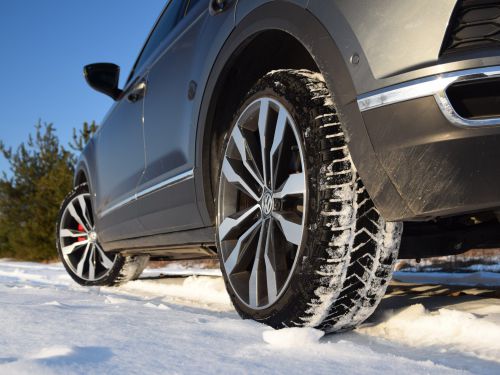You might not have given much thought to your vehicle’s wheels – tyres are tyres, right? But it turns out that the type of tyre you get could affect your vehicle’s performance depending on the weather conditions and the temperature outside. Many people in the UK choose not to switch between winter and summer tyres, instead choosing to use all-season tyres. However, having different tyres for when the weather turns could improve the performance and efficiency of your vehicle.

What are winter tyres?
Despite what some people believe, winter tyres aren’t just for driving in snow. They can provide more grip when it’s raining and improve your vehicle’s stopping distance. But how do they do this?
Winter tyres have a higher rubber content than summer tyres. This reduces the likelihood of the wheels going brittle in the cold weather. Instead, they stay malleable, which improves their grip on the road’s surface and their handling performance. In comparison, summer tyres harden faster in cold temperatures and may not perform as well.
Another feature of winter tyres is additional grooves that are designed to disperse water from underneath the tyres, enabling them to remain in contact with the road and reducing the risk of aquaplaning. These grooves also improve the tyres’ grip in snow and ice.
A deeper tread pattern improves grip too. Compared to standard tyres, the tread is more pronounced and this means that snow can be compacted into the gaps. While this might sound counterintuitive, the snow in the tyres can grip to the snow on the road, decreasing your chances of skidding. You need to monitor your tyres and ensure that the tread doesn’t wear away too much. For standard tyres, it’s recommended that tread doesn’t go below three millimetres, however, for winter tyres, the suggested limit is four millimetres. If this happens, the stopping distance could increase and this may be dangerous, particularly in icy conditions. You should regularly check your tyres to ensure they’re safe to drive on.
Some people believe that, because they live in the UK where it only typically snows a few days a year, they don’t need winter tyres. But these tyres are designed to be used in cold temperatures and not just when it snows. When the temperature dips below seven degrees, these tyres could perform better than summer tyres.
Winter tyres are not mandatory in the UK, however they are in some countries, such as Germany, Austria and Sweden.
What are summer tyres?
Summer tyres are made with slightly less rubber than winter tyres, making them softer and more flexible in mild temperatures. This makes them good on both wet and dry roads when the temperature is above seven degrees. In the UK, we tend to get a lot of rain even in the summer, so these tyres will be good for use between the months of April and October.
Summer tyres don’t have as many grooves as winter tyres, but they still have tread bars to minimise the risk of aquaplaning in rainy weather when there are lots of puddles.
The compound used in summer tyres could reduce your fuel consumption and last for more miles. This is because rolling resistance is reduced, so you need less power to move your vehicle.
Can summer tyres be used all year?
Ideally, summer tyres shouldn’t be used when the temperature drops below seven degrees celsius. This is because they can become too brittle in cold temperature and don’t perform as well. However, they can be used in significantly higher temperatures without getting too soft.
Can you use winter tyres in summer?
Winter tyres are designed to be softer and more flexible than summer tyres. This is so they don’t go too hard in the cold weather. However, this means that if you’re using winter tyres on warm, dry roads, they could become too soft and may wear down much faster.
It’s likely that they will wear down much quicker than summer tyres. This means that using winter tyres in summer isn’t very cost-effective.
Many people choose to use all-season tyres. While they aren’t as effective in either summer or winter as having two different sets, they work better than using winter tyres in summer. Using all-season tyres also means that you don’t need to change all four tyres every six months.
As with any tyre, ensure that they’re always at the correct pressure.
